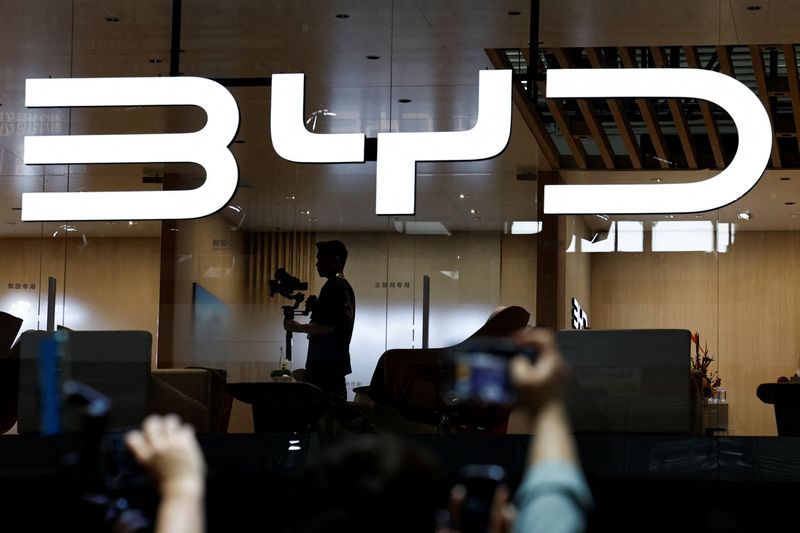SHANGHAI (Reuters) -China's BYD (SZ:002594) launched on Tuesday the latest version of a plug-in hybrid technology that improves fuel and cost savings, intensifying competition with the likes of Toyota (NYSE:TM) and Volkswagen (ETR:VOWG_p) that still sell mainly gasoline cars.
BYD's chairman Wang Chuanfu unveiled the fifth generation of the hybrid technology that achieves a record low fuel consumption of 2.9 litres per 100 km (62.1 miles) on depleted batteries at an event in Shaanxi province's capital Xian.
With a fully charged battery and a full gasoline tank, the technology can ensure a driving range of 2,100 kilometers, Wang said in the city where the company's first automaking factory was located.
BYD also launched sedan versions of its Qin L and Seal 06 models, both equipped with the new technology and priced from 99,800 yuan ($13,775).
Customers using the new technology can save up to 9,682 yuan a year in fuel costs compared to those who drive gasoline models, the company said.
BYD's last generation of plug-in hybrid technology - which touts a driving range of dozens of kilometers on batteries and a fuel consumption of 3.8 litres per 100 km purely on the gasoline engine - has buoyed its rapid growth since 2021 with models such as the Qin Plus DM-i sedan and Song Plus DM-i SUV.
Plug-in hybrids priced from 79,800 yuan have made up the bulk of BYD's sales in the past three years, with an accumulated 3.6 million such cars sold by the company.
The Chinese company slashed prices of its plug-in hybrids by 10%-22% in the first quarter, with Qin and Song outselling gasoline models such as Lavida and Sagitar in the mass market with lower prices and less fuel consumption attracting cost-sensitive Chinese buyers.
Globally, BYD, which has been accelerating its international expansion, still trails multi-branded automakers including Toyota, Volkswagen, General Motors (NYSE:GM) and Stellantis (NYSE:STLA) in sales.
BYD, together with other Chinese EV makers, is posing more of a challenge to Japanese automakers in overseas markets such as Southeast Asia, Australia and Middle East, where governments impose fewer trade barriers and tariffs.
Toyota also showcased on Tuesday next-generation engines which it said would be compatible with alternative fuel sources such as e-fuels and biofuels to reduce carbon emissions and revamp vehicle design by allowing for lower hoods.

Unlike the hybrid technology Toyota pioneered with the Prius in 1997, the plug-in hybrids led by Chinese automakers use larger battery packs and can drive much longer on electricity.
($1 = 7.2448 Chinese yuan renminbi)